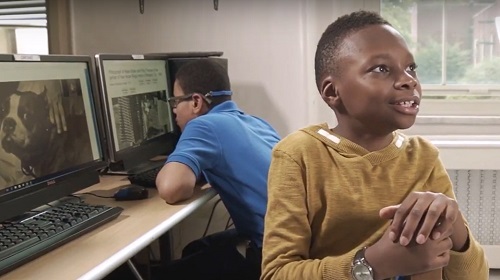"Education should train the child to use his brains, to make for himself a place in the world and maintain his rights even when it seems that society would shove him into the scrap-heap."
-Helen Keller, "Going Back to School," The Home Magazine, September 1934
Students who are blind or visually impaired should have the same educational opportunities and programs as their peers without disabilities. Through research, advocacy, and policy initiatives, AFB is working to create a world of no limits for students who are blind or have low vision. We speak up for children who are blind or visually impaired, to make sure every student has an equal opportunity to succeed.
Last week, the Senate Committee on Health, Education, Labor, and Pensions held a hearing on returning to K-12 schools safely. Considering that students with disabilities are often left out of the conversation, it was exciting to hear that they were considered in multiple lines of questioning presented by the witnesses and the Senators themselves. From the witnesses, we learned that educators are deeply concerned about the digital divide, the health and safety of students and educators, and delivering high quality academics while making up for lost learning.
As schools around the country navigate how and when students might safely be able to return to school, given the COVID-19 pandemic, the American Foundation for the Blind encourages legislators, educators, administrators, superintendents, and parents to ask the following questions:
On May 8, 2020, the American Foundation for the Blind (AFB) and the American Council of the Blind (ACB) joined forces with eight other national organizations to pen a letter to the Chairs and the Ranking Members of the Senate Committee on Health, Education, Labor, and Pension and the House Committee on Education and Labor. The letter is a request to Congress to continue supporting children who are blind or have low vision by opposing waivers that would affect the services that children receive and by providing additional funding to support students’ access to their education.
** Editor's note: We will continue to update this post as we create and gather additional resources. Bookmark this page and check back often! **
As everyone adjusts to our new reality of working from home while simultaneously homeschooling our children, AFB staff have pulled together some online resources that may be helpful.
Esperamos que participe en una encuesta que tiene como objetivo ayudarnos a entender mejor los retos y triunfos que están viviendo, a causa de la pandemia COVID-19, los estudiantes con impedimentos visuales, incluyendo a aquellos con discapacidades múltiples, y aquellos que son sordociegos.
We hope you will participate in a survey to help us better understand the challenges and successes students with visual impairments, including those with multiple disabilities and deafblindness, are experiencing during the COVID-19 pandemic.
As AFB continues its work to protect the rights of blind and low vision students during the COVID-19 pandemic, we asked teachers of students with visual impairments (TVIs) and orientation and mobility (O&M) instructors to share their experiences, from what has worked for them to where their concerns lie in the education of our students with visual impairments.
As AFB continues its work to protect the rights of blind and low vision students during the COVID-19 pandemic, we asked teachers of students with visual impairments (TVIs) and orientation and mobility (O&M) instructors to share their experiences, from what has worked for them to where their concerns lie in the education of their students with visual impairments.
March is Women’s History Month, typically a time to encourage the celebration and study of the vital role of women in American history. But this year, parents and teachers around the world are confronting uniquely challenging circumstances, as schools face unprecedented closures to combat the coronavirus (COVID-19) pandemic.
